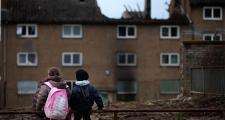We must be careful when we equate poverty with child abuse or neglect

The crisis in child protection – and wider public services – is well-recognised. It is against this backdrop that the Children in Care in the North of England report was published.
The report identifies a litany of challenges facing children and young people and their families, and those who seek to support, protect, or care for them in England, although these challenges are equally applicable to the rest of the UK.
The report is to be welcomed. However, I have concerns about many of the assumptions it makes – concerns informed by my lengthy career in child protection research which has involved studying many thousands of cases across the country.
For a start, looking at ‘the north’ as some homogenous geographical area is a gross simplification. This is exemplified by a consideration of children in care rates. In the north east there are 113 children in care per 10,000. In Yorkshire & Humber it is 81, fewer than the West Midlands' rate of 90.
What’s more, there are large differences even in the same region. For example, the rate at Northumberland County Council is 77, while at Hartlepool Borough Council it's 160.
But by far my biggest disquiet stems from numerous pronouncements in the report that there is some simple and overriding causal link between poverty, child abuse and neglect, and even children being taken into care.
For example, it states “poverty is a causal factor in child maltreatment” and “the rise in child poverty between 2015 and 2020, largely the results of cuts to social security, had a huge impact and disproportionately affected the north of England... It led to over 10,000 additional children entering care in England”.
I find it particularly hard to countenance the proposition that social workers and other practitioners seek to take children and young people into care just because they are poor.
It appears that many of the arguments for there being a link between poverty, child abuse and neglect, and reception into care, are based upon studies that show a correlation between these phenomena.
But as statisticians readily stress, correlation is not causation. The only truly reliable way, in principle, to assess the effect of poverty on both child abuse and neglect, or children’s reception into care would be to utilise the gold standard of research methods – the randomised control trial – but this is clearly impossible to do.
In some families where there is a risk of child abuse and neglect, and/or children entering care, one would expect to find poverty.
Some, if not many of the parents who become known to children’s services, and particularly those who raise high levels of concern, wrestle with significant psychosocial challenges. These challenges increase the risk both of their being in poverty and maltreating their children, which explains much of the observed correlation between these two phenomena.
I understand that poverty can make parenting more difficult and accept that there can be a causal connection between poverty and some instances of child physical abuse, child emotional abuse and child neglect. But I believe we do families a disservice when we look at them as more likely to abuse or neglect their children because of poverty.
Moreover, I find it hard to see such a link with child sexual abuse (CSA). I simply cannot accept that men – who comprise the overwhelming majority of perpetrators – sexually abuse children and young people, most of whom are girls, because they (the perpetrators) are poor.
I also believe that the more serious a case of child abuse and neglect, the less likely poverty is an explanatory factor and the more likely it is the parents’ psychosocial challenges that account for this behaviour.
Reports such as this tend to be dominated by what I would describe as a ‘social-level’ perspective, or more specifically a social policy perspective, in which family ills – whether they concern, for example, child welfare, health, housing or income – are largely, if not solely, down to government policy and sometimes the practice of professionals.
I think they demonstrate far too little consideration of psychological factors, and in particular the adverse childhood experiences, and resultant trauma, that some parents have encountered, and which affect their ability to care for their children.
It must also be accepted that some parents simply do not care for their children – as evidenced by numerous child abuse tragedies.
At the other end of the spectrum, I believe reports such as this do not make sufficient allowance for societal-level factors, and in particular in the case of CSA, the role of patriarchy and misogyny, each of which facilitates the perpetration of sexual, and other, violence against females.
Poverty and child abuse and neglect are grotesque social evils, and it is only appropriate that we do all in our power to combat them.
But if we are to properly understand and deal effectively with these two great evils, it is essential that we put emotion aside and do not make assumptions about the frequency or the strength of the connection between them.
It is this same emotion-laden approach that has led to an over-estimation of the relative significance in the UK of child sexual exploitation (CSE) and female genital mutilation (FGM), and to what the Royal College of Paediatrics and Child Health has referred to as a “hierarchy of abuse”.
I say this not to deny the seriousness of CSE or FGM, but rather to plead that all forms of child abuse and neglect are treated with the same degree of seriousness.
Our approach as social workers should be analytical, considered, and above all, objective. That, after all, is why such emphasis is placed upon evidence-based practice and, in the case of the social sciences, ‘science’.
Bernard Gallagher was a residential social worker in children's homes before pursuing a career as an academic in the social sciences. His specialist area is child protection
